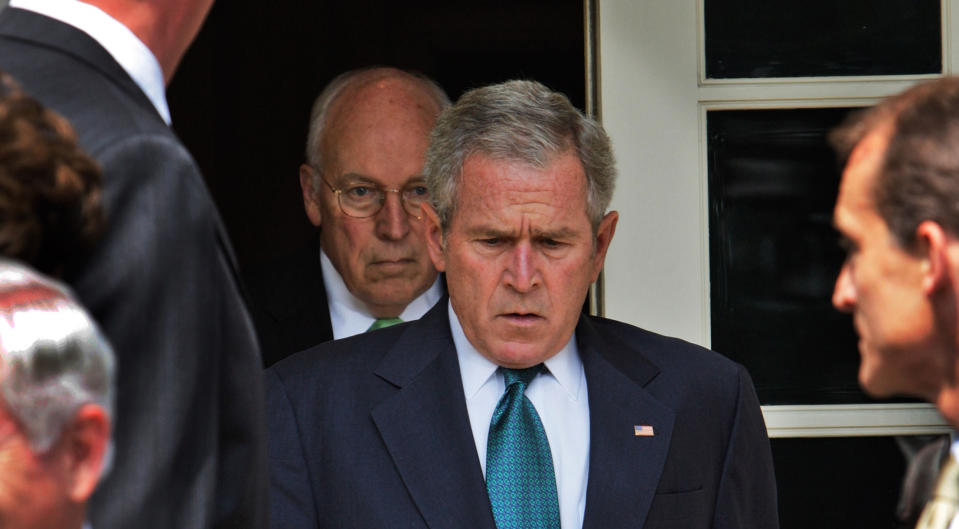Bush, Cheney 'never quite friends,' new book reveals
President George W. Bush and Vice President Dick Cheney were "never quite friends," Peter Baker, chief White House correspondent for The New York Times, writes in his upcoming book, “Days of Fire: Bush and Cheney in the White House."
In an excerpt published on the Times website Thursday, Baker details what he describes as the "final insult in the Bush-Cheney marriage": the president's decision not to pardon "Scooter" Libby, Cheney's former chief of staff, who had been convicted of lying to federal officials investigating the leak of the identity of CIA officer Valerie Plame Wilson.
When Bush informed Cheney of the decision, Cheney snapped: “You are leaving a good man wounded on the field of battle."
“The comment stung,” Bush wrote in his 2010 memoir, "Decision Points." “In eight years, I had never seen Dick like this, or even close to this. I worried that the friendship we had built was about to be severely strained, at best.”
But according to Cheney, there really wasn't a friendship to strain.
“It was professional, more than personal,” Cheney told Baker shortly after leaving office. “We weren’t buddies in that sense.”
While Bush called Cheney “Dick,” Baker wrote, Cheney always called Bush “Mr. President” and referred to him with others as “the Man.”
Even more telling, according to Baker, is the new George W. Bush Presidential Library and Museum in Texas:
There were exhibits featuring the first lady and their daughters, videos narrated by [former Secretary of State Condoleezza] Rice, [former White House chief of staff Joshua] Bolten and Andy Card, and even statues of the presidential dogs. There was little sign of Dick Cheney.
Baker's book also looks to dispel the notion that Cheney was pulling the strings behind the curtain.
“This whole notion that the vice president was the puppet master, I find laughable,” Gen. Richard Myers, who was chairman of the Joint Chiefs of Staff, told Baker. “He was an active vice president because I think he was empowered, but he wasn’t a dominant factor. The alpha male in the White House was the president.”
Cheney's reputation as the administration's "evil genius" was fueled, in part, because he embraced it:
Once his friend David Hume Kennerly greeted him teasingly by saying: “Hi, Dick. Have you blown away any small countries this morning?” Without missing a beat, Cheney replied, “You know, that’s the one thing about this job I really love.” At another point, he tried on a Darth Vader mask his aides had bought and posed for a picture. When he later tried to put the picture in his memoir, his wife, Lynne, talked him out of it.
In reality, Baker writes, it was Rice who became Bush's top lieutenant:
No one in the White House had the relationship with Bush that Rice had. She worked out with him, talked sports with him, dined with him and Laura in the residence and spent weekends with them at Camp David.
Cheney says he wasn't even consulted on the decision to remove Donald Rumsfeld as defense secretary. “It wasn’t open for discussion by the time [Bush] came to me,” Cheney said.



